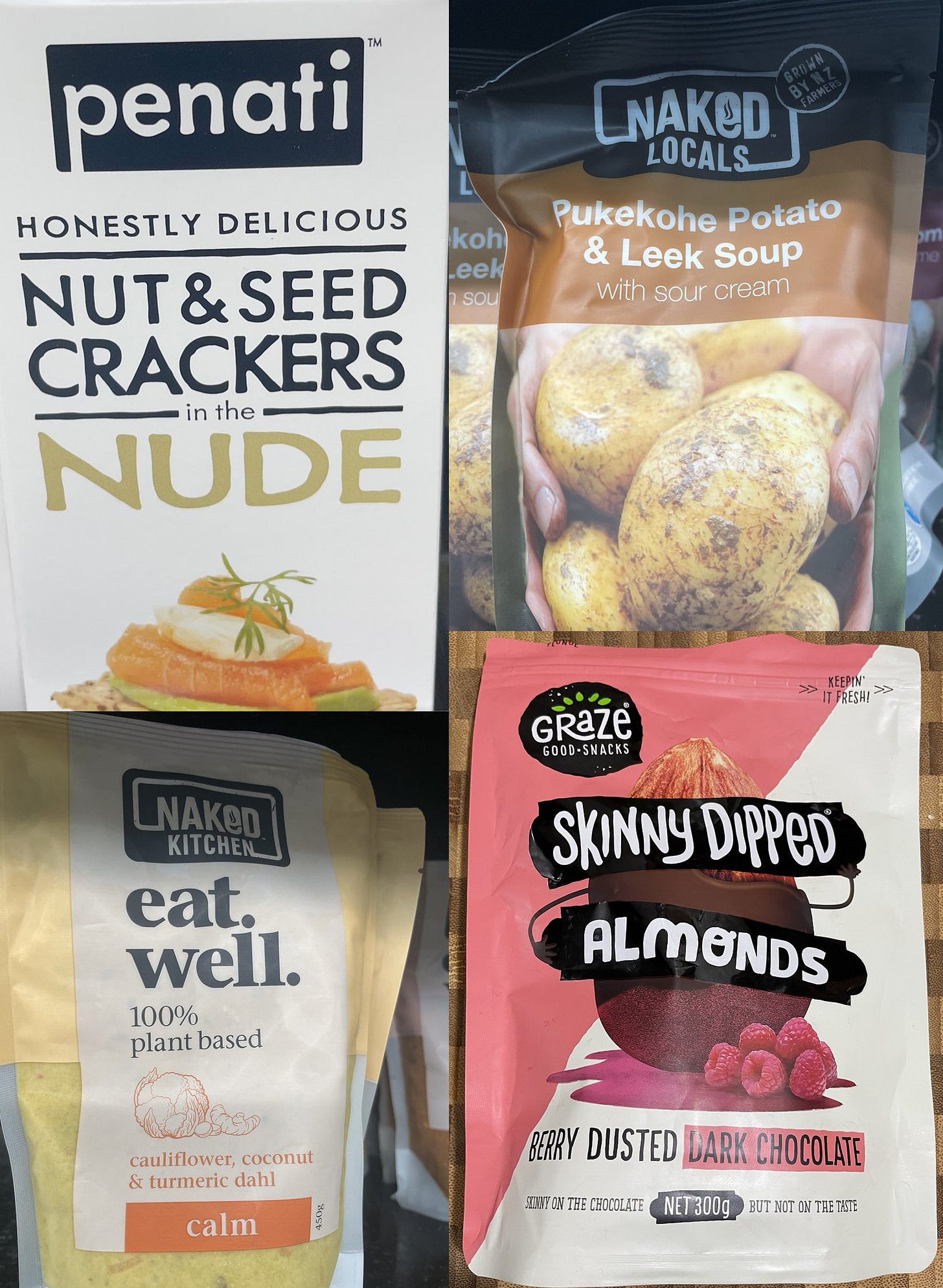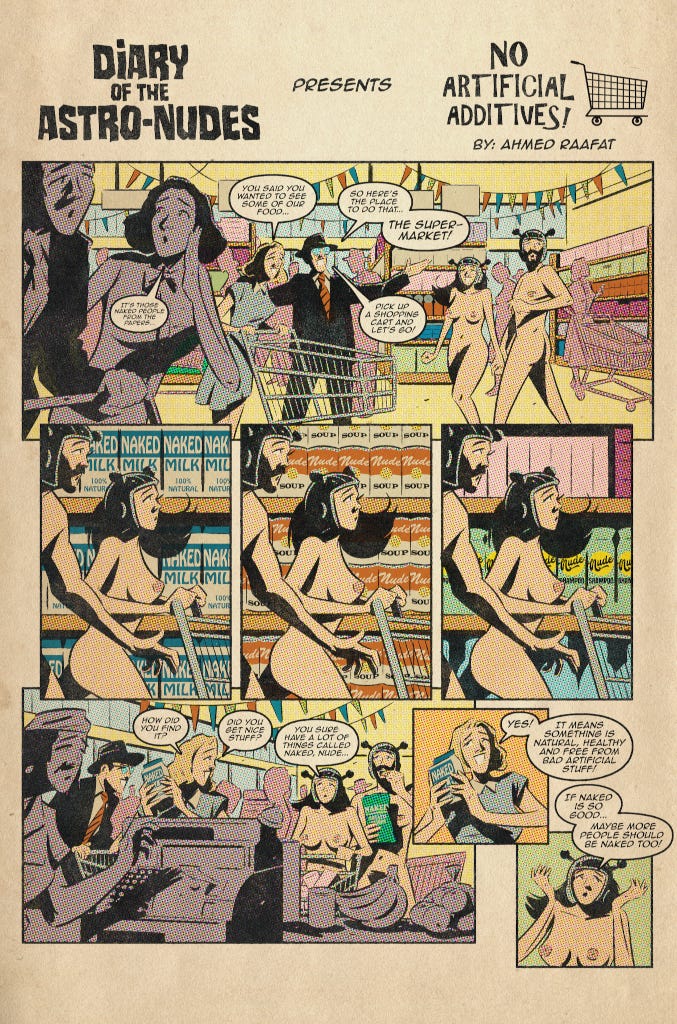There seems to be an increasing number of products that are using the naked or nude label as a way of marketing to customers. In the food line, everything from healthy options to plant-based substitutes and even what was once considered junk food is jumping on the “Naked” marketing bandwagon.
All kinds of foods such as honey, ice creams, breakfast cereals, pot noodles, rice, snack bars, fruit juice, wine, beer and even the humble potato crisps are not immune to the naked marketers.
Remember Jamie Oliver with his Naked Chef series, using the term naked to mean stripped down and simplified, and bringing cooking down to the bare essentials? This is an example of using naked branding to create interest and stand out amongst a plethora of other similar shows.
The trend is not limited to food products. There is a homeware chain here in New Zealand called nood (new objects of desire), and if you are on their customer list you are considered a noodist. They sometimes have radio ads with specials for their noodists, and I am very tempted to rock up naturally to test their resolve. To be fair, the staff at one of their branches during an annual street fair in the town of Petone, worked topless wearing orange body-painted clothing. I take my hat off to those staff, willing to engage in the festival spirit of the day, although their example is the exception rather than the norm.
Recently an Australian television commercial used a nude couple to sell a convertible mini with the tagline “it's a little bit racey”, and even DIY chain stores are using nudity to sell products that would never be considered even remotely natural.
You can get naked cleaning products, naked insurance and my favourite oxymorons of the week, naked clothing and naked makeup. Surely applying an artificial layer onto one's skin, in an effort to look more natural makes no sense to anyone. If you want a natural look, don’t wear makeup, if you want to dress to appear naked, don’t wear anything, it is not rocket science.
Many of these products seem to be using the words naked and nude to pitch their products as natural and desirable, while some even use nudity in their imaging to send a similar message.
Southland-based marketing, communications and design agency Naked Creative uses the word naked to brand itself as being real and authentic. There is nothing specifically naturist friendly about the company or their services, it is simply the branding that helps them stand out in the crowd.
In 2013, the Naked Juice Co (owned by PepsiCo) settled a 9 million dollar lawsuit over claims that their products were “all-natural” when they contained genetically modified Soy. Rather than ditch the Naked branding used to describe a natural product, they simply removed the “all-natural” tag line. The use of the term Naked still implies a natural product, and how many people will assume that it contains only natural ingredients?
The words Nude and Naked when used to advertise, or in branding things, have a powerful association with natural products free from additives. Why then is there a shocked reaction from so many when these terms are applied to people rather than things?
As a trend of normalising naturism and nudity in society, I couldn’t be happier. The more products that are in the marketplace that help expose (pun intended) the fact that nudity is natural and healthy, the better. Additionally, these products help to differentiate between simple nudity and sexual behaviour. While the clever marketing people use nudity and nakedness to sell their product, they are very careful not to use or imply any sexualisation. These are wholesome clean natural products.
I find it interesting that society seems to accept nudity as non-sexual when it is used to sell them stuff but struggles to make that distinction when presented with actual nudity.
Do consumers see the branding as a healthy option, or do they see it as a cheeky attempt to get a product to stand apart from all its competitors? How many people really think that naked potato crisps or nude ice cream are healthy options?
Perhaps buying a soup pouch or a naked fruit juice, lets them feel daring and provocative without having to actually move out of their comfort zone. Look at me, I'm modern, accepting and rebellious. I’ll buy a naked snack bar to demonstrate how progressive I am, but take your clothes off and I’ll call the authorities.
It is curious that so many companies are keen to use nudity, or naked branding as a positive and appealing trait when much of society has an unfavourable attitude toward people who choose not to wear clothes.
While these companies and their clever marketing agencies are embracing naturist imagery and language to increase sales, one wonders how true they are to the message or whether they are paying lip service in order to maximise profits.
Is it tokenism if the same companies using the naked message in their marketing do not offer their staff both the opportunity and encouragement to disrobe in the workplace?
Does the use of nudity and naked marketing amount to appropriation? Or should we be grateful that companies are normalising nakedness by stealth?
Thank you for reading, have a comfortable day.
P.S.
Talk about fortuitous timing. Ahmed Raafat (@TheAhmedRaafat) has just posted this wonderful one-off page featuring the Astro-nudes which covers the topic of nude branding. Thanks to Ahmed for permission to post it here, and please check out his wonderful Diary of the Astro-nudes work @AstronudesComic








Hi Steve, another great article. The reason nudity and naked are so prevalent in advertising is that sex sells and sadly nudity and nakedness is stiil seen by mainstream society as prurient. Happily your articles, like Naked Wanderings, It's Just a Bum and a few others are edging naturism slowing towards normalisation.
It's great up on the Moors eh, especially when the weather is so sunny. Even though the sun is not quite as strong there make sure you slipslapslop :)
There was a TV ad for Absolute Vodka in which all their employees appeared naked in the ad (FB safe version of naked) to show they had nothing to hide in their manufacturing.
There is also an Icelandic TV ad for a smartwatch, where the watch was all you really needed. It had nude people of a variety of body shapes doing a variety of activities and wearing only the smartwatch.. It was NOT FB safe in the slightest. However it still ran on Icelandic television in prime time and without any parental warning. Good for them.
Sometimes people use "naked" in their ad and we can take it seriously.
Re: the Naked Juice thing. A long time ago I belonged to a Naked Dares group. The idea was to do photos of one naked in unlikely locations and not get caught. I did a photo in front of the Naked Juice factory in Monrovia, near LA with the sign in the background.